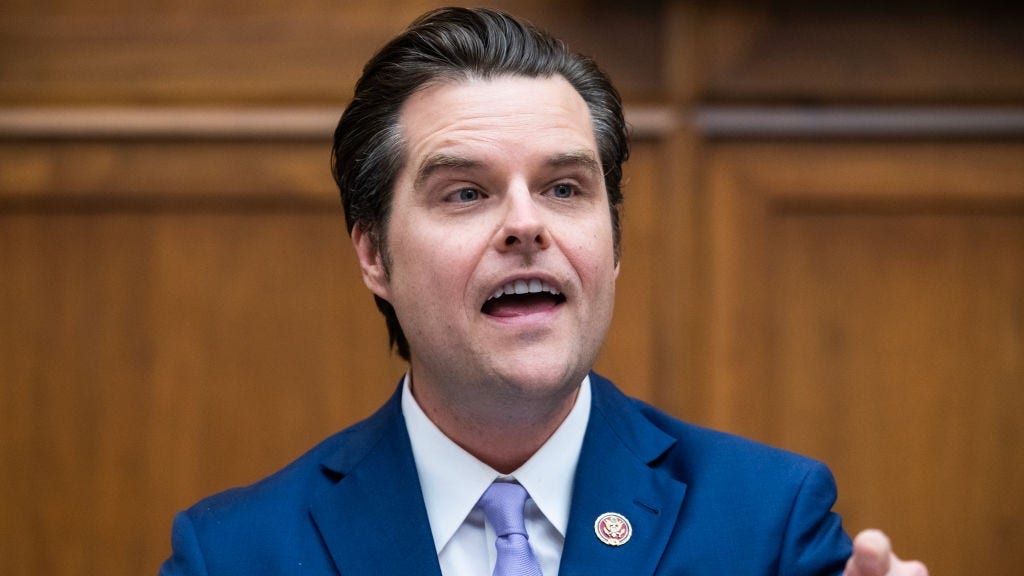Former Congressman Matt Gaetz’s legal challenge against the House Ethics Committee’s impending report has ignited a contentious debate concerning congressional ethics investigations, the scope of their authority, and the rights of former members. Gaetz, a Republican who represented Florida’s 1st congressional district, filed a lawsuit in federal court seeking to prevent the release of the committee’s findings, alleging that the report contains false accusations and that the committee lacks jurisdiction over him now that he is no longer a member of the House of Representatives. This legal maneuver raises complex questions about the extent to which former members of Congress remain subject to the scrutiny of ethics investigations and the potential implications for future accountability.
The crux of Gaetz’s argument rests on the assertion that the Ethics Committee’s jurisdiction extends only to current members of the House. He contends that once a member leaves office, they are no longer subject to the committee’s investigative powers. This argument challenges the established practice of the Ethics Committee, which has historically investigated and issued reports on former members for conduct that occurred during their time in office. Gaetz’s legal team argues that this practice lacks a clear statutory basis and violates his due process rights. They further claim that the committee failed to adhere to its own rules and procedures during the investigation, thereby undermining its legitimacy.
The Ethics Committee’s investigation into Gaetz stemmed from a series of allegations that emerged in 2021. These allegations included accusations of sex trafficking, obstruction of justice, and violations of campaign finance laws. While the Department of Justice declined to file criminal charges against Gaetz, the Ethics Committee continued its own investigation into his conduct. Gaetz has vehemently denied all allegations, claiming they are politically motivated and part of a broader effort to tarnish his reputation. He asserts that the committee’s investigation is biased and lacks credible evidence to support its findings.
Gaetz’s lawsuit has broader implications for the future of congressional ethics investigations. If successful, it could significantly curtail the committee’s ability to hold former members accountable for their actions while in office. This could create a loophole that allows individuals to evade scrutiny by simply resigning before an investigation is concluded. Conversely, proponents of Gaetz’s position argue that extending the committee’s jurisdiction indefinitely over former members could lead to politically motivated investigations and infringe on their rights after leaving public service. The court’s decision in this case will likely set a precedent with far-reaching consequences for congressional ethics enforcement.
The lawsuit also underscores the ongoing tension between the executive and legislative branches regarding investigations into members of Congress. Gaetz’s legal team has criticized the Department of Justice for allegedly leaking information to the Ethics Committee, claiming this constitutes an improper interference with the legislative branch’s internal processes. They argue that this alleged collaboration undermines the separation of powers and violates Gaetz’s constitutional rights. This aspect of the case highlights the complex interplay between different branches of government when investigating allegations of misconduct by members of Congress.
The outcome of Gaetz’s lawsuit will have significant repercussions for both the individuals involved and the broader framework of congressional ethics. A ruling in his favor could restrict the Ethics Committee’s authority, creating a potential shield for former members against accountability for actions taken during their tenure. On the other hand, a decision upholding the committee’s jurisdiction could reinforce the importance of oversight and accountability, even after a member leaves office. The court’s analysis of the relevant legal principles and precedents will shape the future landscape of congressional ethics investigations and the ability of the House to maintain its integrity. This case serves as a crucial test of the balance between protecting individual rights and ensuring ethical conduct in the halls of Congress.


